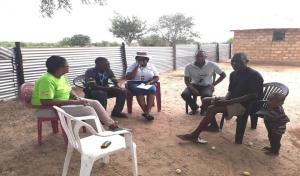Strengthening surveillance for Guinea worm disease in Northern Namibia
A case of Guinea worm disease (GWD) was confirmed in Angola in June 2018. The case, an eight-year girl, hails from the Cunene Province in Angola, which borders Ohangwena and Omusati Regions in Namibia. In response, Angolan authorities, with WHO support, carried out further case searches in three southern provinces of the country, including Cunene. During the exercise, a suspected case was detected who, at the time of her illness, had travelled to Engela in Ohangwena Region for a wedding and was treated at the Engela District Hospital. Although this suspect was not confirmed to be a case of GWD by investigators from both Angola and Namibia, the situation has alerted Namibian Authorities. Namibia has never been endemic for GWD and was certified free in 1999. Given that GWD has been confirmed in its immediate northern neighbouring province of Cunene in Angola, it is important to do a thorough case search along the Angolan border to determine whether GWD exists in Northern Namibia, as part of efforts to strengthen GWD surveillance.
WHO, with support from its Regional Office for Africa, trained 17 Ministry of Health field epidemiologists and other partners to conduct active case search in Omusati and Ohangwena Regions along the Angolan border from 25 February to 8 March 2019. The objective was to:
- Determine whether or not there is Guinea worm disease (GWD) in Namibia
- Assess risk factors for GWD transmission
- Assess opportunities for strengthening GWD surveillance and response by the national heath system
- Make recommendations and action points on the way forward
The team visited 32% of health facilities in the two regions, met over 200 health workers and visited a total of 875 households in 89 villages. It was found that most respondents (46%) use safe water while 21% use unsafe water and 34% use both safe and unsafe water sources. The lack of knowledge on GWD was highlighted as one of the key risk factors as well as its management by both health workers and the community.
The detailed report was presented to the MoHSS management team. No cases of GWD was detected in the two regions however health authorities remain vigilant to monitor any potential cases and will continue with community health education.



